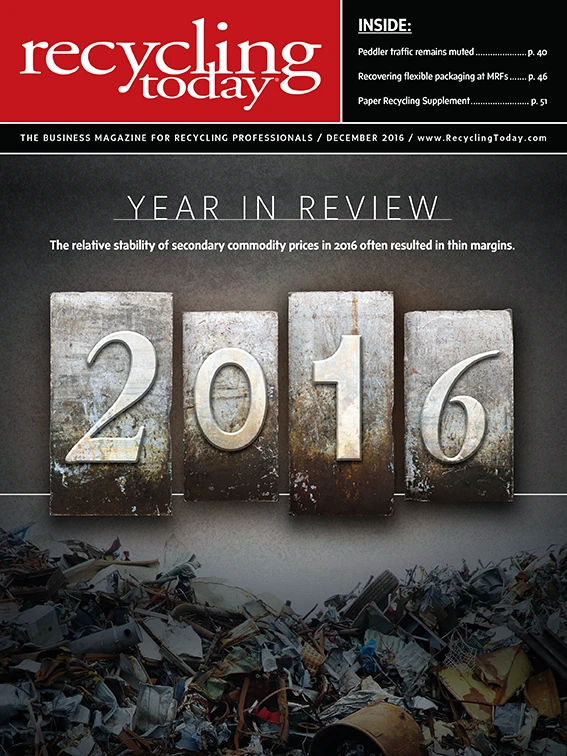The month of November brought sweeping change in the form of a presidential election upset by Republican candidate Donald J. Trump. It did not take long after that for the Trump transition team to announce an appointment with direct implications for steelmakers and ferrous scrap recyclers.
The November ferrous scrap buying period that partially coincided with the election brought cheer to recyclers no matter their political preferences, as overseas buyers made their highest bids for scrap in several months.
That was followed by per-ton prices paid by domestic mills that rose approximately $25, depending on the grade and region, according to American Metal Market’s (AMM’s) pricing surveys.

AMM’s export price changes for early November showed an even sharper contrast, with its East Coast index figure rising by $56 per ton and the West Coast index gaining $39 per ton in value.
One recycler who works for a company with several U.S. locations says his yards are filling orders enthusiastically for the first time in several months. He indicates his company’s barge loading activity has increased in early November thanks to a level of export orders that has not been seen in some time.
As measured by AMM’s No. 1 busheling grade, the November rise in ferrous scrap prices was the first one since April (not including a gain of less than $1 in June).
Within 24 hours of the release of AMM’s November figures, steelmakers and scrap recyclers learned (also via AMM) that a former CEO of Charlotte, North Carolina-based Nucor Corp. had been appointed to President-elect Trump’s transition team, with specific responsibilities for the Office of the U.S. Trade Representative (USTR).
The USTR says it is “responsible for developing and coordinating U.S. international trade, commodity and direct investment policy and overseeing negotiations with other countries.”
DiMicco, in his role as Nucor’s CEO and particularly in his capacity as a former chairman of the Washington-based American Iron and Steel Institute (AISI), has been critical of the steel exporting activities of China and other nations.
Steelmakers (and aluminum producers) have been among the foremost critics of China’s behavior as being at odds with its goal of being accepted as a market economy nation.
AISI has been decrying the output of finished steel by Chinese state-owned enterprises for several years. AISI’s position, as stated on its website, is that “China—a nonmarket economy, a significant exporter and by far the world’s largest steel producer—has disrupted world markets through state support of expanded production of steel and steel-containing products.”
China’s overcapacity and subsequent mass exporting of steel have reduced output from steel producers in North America and global demand for ferrous scrap, critics say. With China’s steel output being largely iron ore-dependent basic oxygen furnace production, much of the market share it has taken away from steelmakers in other parts of the world is based on the scrap-dependent electric arc furnace method, resulting in lower steel and ferrous scrap prices in the U.S.
Should the Trump administration propose or make meaningful changes to the U.S. trading relationship with nations including Mexico and China, as he declared on the campaign trail, it would reverse the largely bipartisan policy of liberalized trade that has lasted several decades.
Another change that may affect the ferrous scrap market in 2017 involves the efforts of World Steel Exchange Marketing (WSEM), Englewood Cliffs, New Jersey, and other entities to spur hedging and exchange-based steel scrap trading.

The NFX futures exchange, which is owned by Nasdaq, has agreed to launch the Midwest U.S. Shredded Steel Scrap TSI Index futures on its platform. According to an announcement by WSEM, the shredded scrap futures will be “the cornerstone for a suite of NFX ferrous products.”
The contract is 20 gross tons and will be listed for the current month and the next 11 months, WSEM says. It will trade 22 hours per day from 7 p.m. Sunday (Eastern time) through Friday at 5 p.m. (Eastern time).
Its 17 original and committed clearing members include the largest commodity brokers and energy traders in the U.S., WSEM says.
“NFX shredded futures will provide an effective price-risk management tool for: a) 50-60 million metric tons of annual U.S. scrap consumption; b) 90-plus million metric tons of annual global scrap trading; and c) 200-plus million metric tons of non-Chinese steel product output each year whose price is impacted by changes in the steel scrap price,” writes WSEM’s Peter Marcus in a letter announcing the agreement.
Marcus also says the changing nature of China’s steel and scrap markets is a reason for traders to consider futures contracts. “Rising Chinese steel scrap exports in the years ahead will stimulate steel scrap futures trading,” he writes.

Explore the December 2016 Issue
Check out more from this issue and find your next story to read.
Latest from Recycling Today
- Alberta Ag-Plastic pilot program continues, expands with renewed funding
- ReMA urges open intra-North American scrap trade
- Axium awarded by regional organization
- China to introduce steel export quotas
- Thyssenkrupp idles capacity in Europe
- Phoenix Technologies closes Ohio rPET facility
- EPA selects 2 governments in Pennsylvania to receive recycling, waste grants
- NWRA Florida Chapter announces 2025 Legislative Champion Awards





